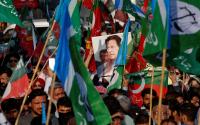The Guardian,5 December, 2001Is Ariel Sharon trying to kill Yasser Arafat? Can this be the policy of the prime minister of Israel, to kill the man renowned the world over as Mr Palestine, symbol of an entire nation?
It looks that way as the rockets rain down, reaching deep into Arafat's Gaza compound, even following him yesterday into his office in Ramallah, striking as he worked inside. But so far those missiles have missed - deliberately so. Sharon may have Arafat in his sights, but he has not yet pulled the trigger.
So what is the Israeli PM up to, what game is he playing? Start with the most charitable reading, the one that says Ariel Sharon - elected on a promise to bring peace and security and having palpably failed to bring either - has no game-plan at all. On this theory, he is simply lashing out, hitting at the only visible, spectacular targets he can find. He has no strategy: just the unfiltered urge for revenge after 26 Israelis, many of them teenagers, were murdered by three bombs in 24 hours.
Let's give Sharon more credit than that. Perhaps these are warning shots, sent to tell Arafat he has one last chance to stop terrorists operating from the territories he is meant to govern and that there is a price to pay if he does not. Taking out Arafat's aged, creaky fleet of helicopters and bombing his personal airstrip were intended to ram home the same message: stay home and bring order. Today we clip your wings, denting your prestige as the globetrotting national leader. Tomorrow we bring not humiliation, but elimination.
Which brings us to the third possibility: that this is not brinkmanship, but the beginning of a serious attempt to topple the Palestinian Authority, driving Arafat into exile and reshaping the entire political landscape.
Sharon has been "flirting" with that idea for a while, says one western official who knows him well. Now, he fears, the PM may be about to "go all the way". There was a clue to the new thinking in Sharon's televised address to the Israeli people on Monday night. "We know who is guilty," he declared. "Arafat is responsible for everything that happens here... This time, Arafat will not succeed in fooling us."
But where Sharon speaks in hints, his rightwing confrères are more forthright. Sharon's predecessor (and would-be successor), Bibi Netanyahu, spoke openly yesterday of a new strategy, admitting that he, like the rest of Israel's hawks, is dreaming of life after Arafat. "Israel would not necessarily have to place a government" for the Palestinians, he told The World at One yesterday, musing happily on the prospect of a post-Arafat Palestine. "Any future government would know it has to stop terror or lose power." This new generation of leaders would crack down on terror, says Bibi, because they would know their fate if they did not: they would not want to go the way of Arafat.
And who does the Israeli right imagine would take the place of the current regime? Surely, the vacuum would be filled either by chaos and anarchy or the rising force in Palestinian politics, the extremists of Hamas and Islamic Jihad. Both would be much less amenable than Arafat. While he remains a secular politician committed to a two-state solution that places the future Palestine alongside Israel, the Islamists want the total destruction of the Jewish state.
Yet the hawks are not fazed. People feared the worst from the war in Afghanistan, they say, and those nightmares did not come true either. They are confident that it will not be mullahs and ayatollahs who take Arafat's place but "local commanders", regional warlords free of the old ideology of liberation who will soon realise it's in their best interests to reach an understanding with Israel. Sharon's hard-right infrastructure minister, Avigdor Lieberman, has it all mapped out: he wants to divide the territories into four cantons, each one separate from the other. There will be no passage between Gaza and the West Bank, none between Hebron and Ramallah. The bases of terror will be rooted out.
These ideas sound like pure fantasy to outsiders, but they are gaining ground in Israel. The reason why is not mysterious, but centres precisely on the man at the heart of the matter: Yasser Arafat. It has become a matter of consensus in Israel that Arafat is part of the problem. Labour and Likud divide on whether he can ever be part of the solution - Shimon Peres believes he still can, Sharon has written him off - and that difference could split the current, national unity coalition. Either way, few Israelis regard Arafat as anything but a major problem.
The generous say his flaw is not so much malice as weakness; he no longer carries his people with him and cannot deliver. On terrorism they charge that he is simply unable to root it out, that he is powerless to stop young men, bent on paradise, crossing into Israel determined to murder teenagers. If he cannot bring peace, they ask, what's the point of dealing with him?
His harsher critics think his flaw goes beyond feebleness. They say Arafat indulges terrorism when he does not positively encourage it. They note his half-hearted arrests of Hamas militants - "invited to sit in jail, have a cup of coffee and released after five minutes" according to one Israeli official - his "state funerals" for suicide bombers and the incitement to anti-Israeli violence which airs around the clock on the Palestinian media which he tightly controls. For them, Arafat is not a beleaguered peacemaker vainly struggling to curb rejectionist hardliners but a terrorist godfather presiding over a safe haven for men determined to kill innocents. With that as their logic, the hawks can see no alternative but to remove Arafat for the same reason the United States wants to remove the Taliban.
For Sharon, the idea must have special appeal: after all, he's tried it before. His last grand scheme, Israel's 1982 invasion of Lebanon, was also aimed at smashing Arafat and driving him into exile. Earlier his Likud party had sought to create "village leagues" in the West Bank, as an alternative to PLO-supporting local mayors. Then, as now, Sharon had the same desire - to create a different Palestinian people so that he would not have to deal with the real one.
It cannot work, of course. It is a total fantasy, an attempt to escape reality. Sharon, in particular, cannot contemplate what really has to be done - to sit down, talk and reach an accord with the enemy - because that will mean paying an unbearable price. Any peace deal will entail dismantling some, if not all, of Israel's settlements in the occupied territories. And yet these red-roofed villages have been the driving obsession of Sharon's career over nearly three decades. He cannot face tearing them down. As that well-placed official puts it: "No grandfather wants to destroy his grandchildren."
So Sharon will seek comfort in his dream of a quiescent Palestinian population, rather than a proud people, led by pliable warlords, rather than a national figurehead. His dream will fail, but who knows how much blood will be lost before it does?






